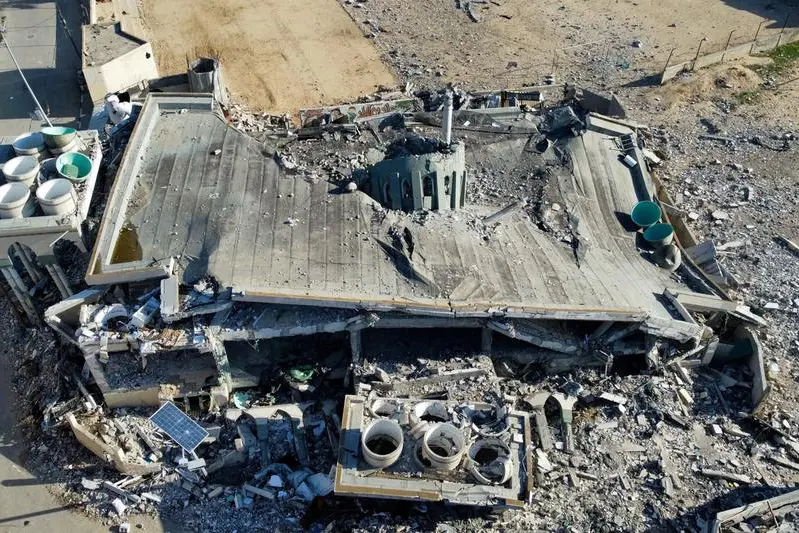PHOTO
Israeli tanks storming southern Gaza's main city reached the gates of two hospitals on Monday, cutting residents off from trauma care as the bloodiest fighting of the new year tore through areas sheltering hundreds of thousands of displaced.
Residents said bombardment from air, land and sea was the most intense in southern Gaza since the war began in October, as Israeli tanks surged across Khan Younis from the east into the western areas close to the Mediterranean coast.
Video images filmed from afar showed scattered civilians wandering a ghost city, crowded with tents with abandoned laundry flapping on lines, as gunfire rattled and columns of smoke rose into the sky.
Israel launched an offensive last week to capture Khan Younis, which it now says is the principal headquarters of the Hamas militants responsible for the Oct. 7 attacks on southern Israel that killed 1,200 people, according to Israeli tallies.
The newest phase of the war has brought fighting deep into the last corners of the enclave now packed with those who fled bombardment that has killed at least 25,295 people since Oct. 7, Gaza health authorities said in an update on Monday.
The majority of Gaza's 2.3 million residents are now penned into two towns, Deir al-Balah and Rafah, just north and south of Khan Younis respectively. They are crammed into public buildings and vast camps of tents made from plastic sheets lashed to makeshift wooden frames.
The Palestinian Red Crescent said it had lost all contact with its staff at its Al-Amal Hospital in Khan Younis, main base for the rescue agency, where Israeli tanks were parked outside.
Further west, advancing Israeli tanks had reached the al-Mawasi district near the Mediterranean Coast for the first time, cutting off its Al-Khair hospital and stationing themselves around nearby Al-Aqsa university, heaving with thousands of displaced civilians.
At Nasser Hospital, the only major hospital still accessible in Khan Younis and the largest still functioning in Gaza, witnesses said the trauma ward was overwehelmed with wounded being treated on the floor and in hallways.
Health officials said least 20 dead bodies had arrived there overnight and they expected many more later, as tanks on the streets made it hard for rescuers to recover them.
"The occupation has overnight launched an unprecedented ground and air war on Khan Younis. People are trapped near Mawasi, people are trapped in Al-Amal hospital, in Al-Aqsa University. People are carrying the dead and wounded on donkey carts," said a medic inside Nasser Hospital who declined to give his name for fear of reprisals.
Gaza health ministry spokesperson Ashraf Al-Qidra said in a statement that dozens of dead and wounded were trapped in areas targeted by Israeli troops.
"The Israeli occupation is preventing ambulance vehicles from moving to recover bodies of martyrs and the wounded from western Khan Younis," he said.
NETANYAHU DEFIES WASHINGTON
A morning update on the fighting from the Israeli military made no mention of the huge battle in Khan Younis, giving details of combat only in other areas, in the north and south of the Gaza Strip.
The storming of western parts of Khan Younis is the culmination of a battle that Israeli officials have depicted as their last large-scale ground assault before they shift to lower-intensity, more targeted operations to eradicate Hamas.
They have not spelled out their plans for the remaining areas, Rafah and Deir al-Balah, where most Gazans are now sheltering, with food and medicine running out and nightly Israeli air strikes killing families as they sleep.
Israel says it will not stop fighting until Hamas is completely eradicated, and accuses Hamas of using civilians for cover, which it denies. But Palestinians and many Western military experts say that objective may be unachievable because of Hamas's diffuse and deeply rooted structure in Gaza, which the group has run since 2007.
Last week, Prime Minister Benjamin Netanyahu broke firmly with Israel's main ally the United States, disavowing any future plans for an independent Palestinian state.
Washington says that maintaining a path towards an independent Palestinian state, the bedrock of U.S. policy in the region for decades, is the only way to make peace with the bulk of Israel's Arab neighbours and rebuild Gaza after the war.
Though Israelis overwhelmingly support the war, a growing, outspoken number led by relatives of the remaining hostages say the government should do more to reach a deal to free them, even if that means reining in its offensive.
Netanyahu, leader of a coalition that includes far right parties, said on Sunday he would make no deal to free the hostages that required leaving Hamas unvanquished.
"I reject outright the terms of surrender of the monsters of Hamas," Netanyahu said. He said he had stood up firmly to "international and internal pressures" to step back from his position that Israel must permanently retain full security control of all land west of the Jordan River.
"My insistence is what prevented for years the establishment of a Palestinian state that would have posed an existential danger to Israel."
Sami al-Zuhri, head of Hamas' political unit in exile, told Reuters on Monday Hamas was open to "all initiatives and proposals but any agreement must be based on ending the aggression and the occupation's complete withdrawal" from Gaza.
A group of families of hostages, the Hostages and Missing Persons Families Forum, demanded in a statement that Netanyahu "clearly state that we will not abandon civilians, soldiers, and others kidnapped in the October debacle.
"We must advance the deal now," it added. "If the prime minister decides to sacrifice the hostages, he should show leadership and honestly share his position with the Israeli public."
(Reporting by Nidal al-Mughrabi in Doha and Bassam Masoud in Gaza; writing by Peter Graff; editing by Mark Heinrich)





















